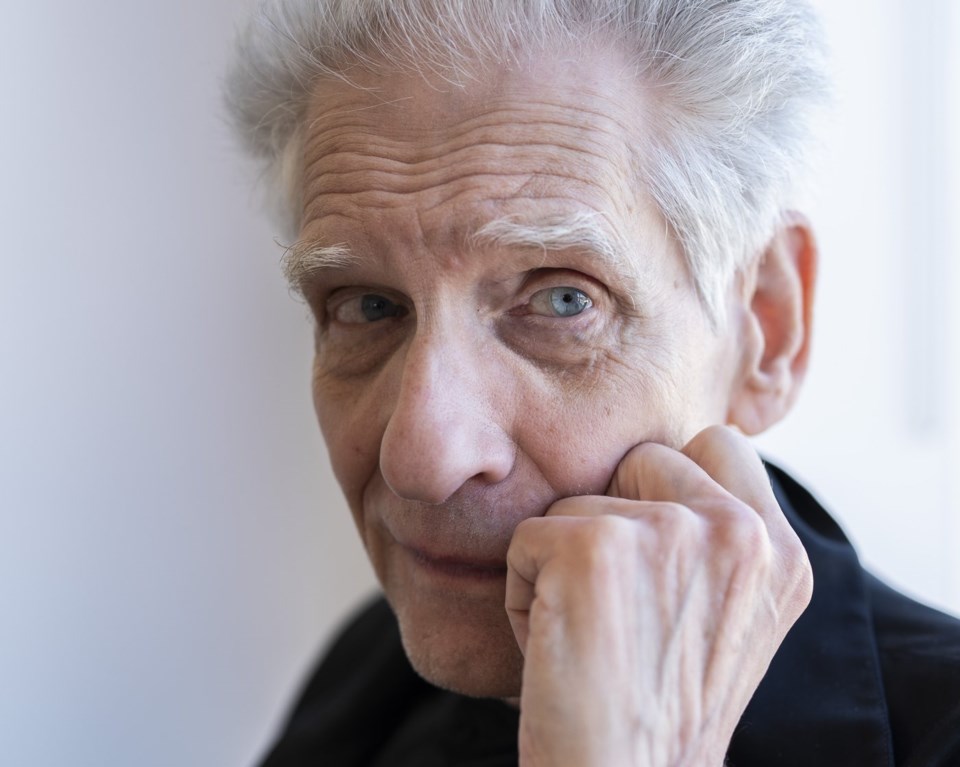TORONTO — David Cronenberg has confronted death on screen his entire career. But at 82, he’s feeling its creeping presence in his own life.
“My relationship with death is getting more and more intimate the older I get. That's inevitable. Every day in the paper I read about somebody exactly my age who's just croaked,” said the Canadian body-horror master known for helming macabre classics such as “The Fly,” “Dead Ringers” and “Videodrome.”
“It's difficult to not be thinking about it.”
That intimacy with mortality became painfully real in 2017, when Cronenberg lost his wife of 43 years, Carolyn, to cancer. Her passing altered the way he thought about loss and what lingers after someone is gone.
Cronenberg said he didn't expect to make another film after 2022's "Crimes of the Future," but his enduring grief demanded one.
“There are many great grief books, which I read, and none of them represented my experience of it. It was interesting and I realized that that sense of loss and grief is unique to everybody,” said Cronenberg while at the Toronto International Film Festival last fall.
“You have your own version of it, and it depends on you and your past and your relationship. So I felt completely free and empowered in a way to make my own version of that in a movie.”
With “The Shrouds,” Cronenberg’s latest feature debuting in U.S. theatres Friday and opening in Canada next week, the director turns his lifelong fascination with the decaying body into something rawer: an exploration of grief, technology and the desire to stay connected with the dead.
Vincent Cassel stars as Karsh Relikh, the widowed inventor of a new technology that allows the bereaved to monitor the disintegrating corpses of their loved ones. When the grave of his wife Becca, played by Diane Kruger, is violated, he becomes obsessed with finding the perpetrator.
Even Cassel's appearance suggests the autobiographical nature of the film, with the actor taking on Cronenberg's likeness, white pompadour hairstyle and all.
Kruger pulls triple duty in the Toronto-set film, portraying not only Becca but also her look-alike sister Terry and Karsh’s AI assistant Hunny.
“When you lose someone you love so much, I think you see them everywhere. You cannot unsee them,” explained Kruger of her multiple roles.
The German actor said she grew up watching Cronenberg’s films, but found “The Shrouds” to be “very emotional and very personal, which I really respond to.”
Karsh has several flashbacks to intimate moments with Becca where the illness has visibly taken over her body. Kruger said these scenes were inspired by real-life moments between Cronenberg and his wife.
“When you know that that is very personal for the director and some of it happened… I definitely felt a little uncomfortable. It wasn't an easy day for me,” she shared.
“Not that David put that on me, but I couldn't help thinking that he was there sitting at his monitor and reliving some really painful things in his life.”
Cronenberg said he wanted to channel the deeply visceral nature of grieving a spouse, where the loss isn’t just emotional, but physical.
“This is someone you made love to, you've created children with. It's actually quite different from the death of your parents, however painful that can be, and my parents died quite a long time ago, so I know the difference,” he shared.
“Here's somebody whose body was so much a part of your life… And so it is the loss of a body, not just a voice or a memory.”
Toronto actor Sandrine Holt, who plays Karsh’s new love interest Soo-Min, thinks the protagonist’s fixation with his wife’s remains says as much about control as it does about love.
“Death is inescapable, and to try to obsessively control that with technology, I think it's a commentary on our world today,” she said.
“(Technology) has just really affected how we interact, from dating apps to how people deal with illnesses… It’s funny because I think we are creating a more lonely culture.”
For Cronenberg, art offers a sense of control over the inevitable.
“A lot of art comes out of fear, out of things you're afraid will happen to you, to your loved ones, to the world. And dealing with that in art gives you the illusion of some kind of control. You're able to manipulate the story and make it go this way or that way,” he said.
But the filmmaker said he’s ultimately never found the creative process to be therapeutic.
“It’s never satisfying. I mean, it's satisfying on the level of creativity, but it's not satisfying in the sense of catharsis.”
An atheist, Cronenberg also doesn’t look to religion for comfort. He believes in staring death straight in the eye.
“I think all religion is a way of dealing with death and in some ways evading the reality of it by saying, you'll be in heaven, you'll be in hell, there'll be an afterlife out of it,” he said.
“Everybody who is religious is not really dealing with the reality of death. That's what I think. So I guess maybe I'm more comfortable with it. It's an existentialist approach to life.”
This report by The Canadian Press was first published April 18, 2025.
Alex Nino Gheciu, The Canadian Press


